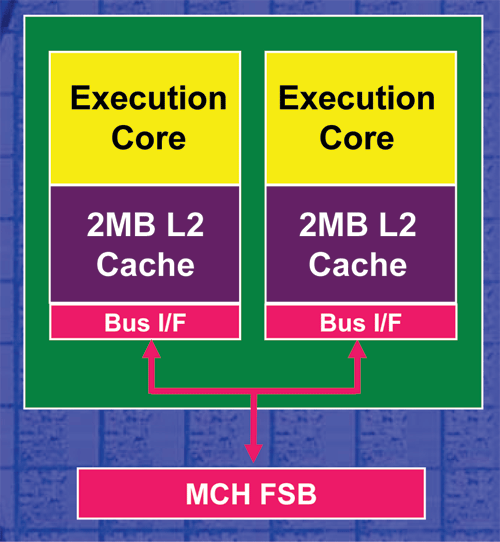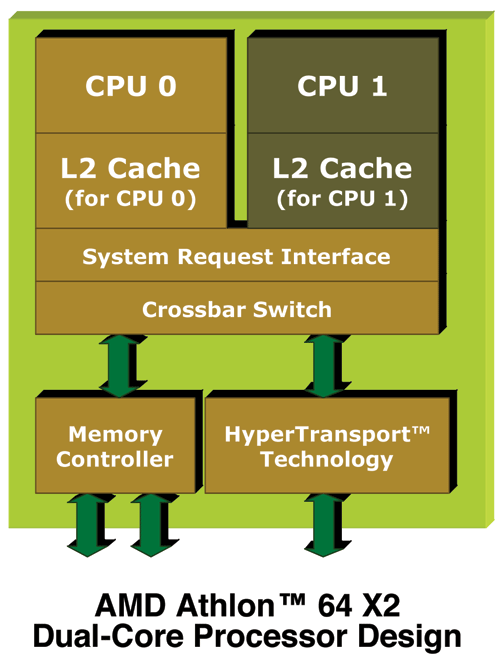AMD's dual core Opteron & Athlon 64 X2 - Server/Desktop Performance Preview
by Anand Lal Shimpi, Jason Clark & Ross Whitehead on April 21, 2005 9:25 AM EST- Posted in
- CPUs
A Look at AMD's Dual Core Architecture
Even Intel will admit that the architecture of the Pentium D is not the most desirable as is two Pentium 4 cores literally glued together. The two cores can barely be managed independently from a power consumption standpoint (they still share the same voltage and must run in the same power state) and all communication between cores must go over the external FSB. The diagram below should illustrate the latter point pretty well:
Intel's Pentium D dual core architecture
AMD's architecture is much more sophisticated, thanks to the K8 architecture's on-die North Bridge. While we normally only discuss the benefits of the K8's on-die memory controller, the on-die North Bridge is extremely important for dual core. Instead of having all communication between the cores go over an external FSB, each core will put its request on the System Request Queue (SRQ) and when resources are available, the request will be sent to the appropriate execution core - all without leaving the confines of the CPU's die. There are numerous benefits to AMD's implementation, and in heavily multithreaded/multitasking scenarios, it is possible for AMD to have a performance advantage over Intel just because of this implementation detail alone.

AMD's solution to the problem will come in the form of DDR2 and a new socket down the road, but for now there's no getting around the memory bandwidth limitations. Intel is actually in a better position from a memory bandwidth standpoint. At this point, their chipsets provide more memory bandwidth than what a single core needs with their dual channel DDR2-667 controller. The problem is that the Intel dual core CPUs still run on a 64-bit wide 800MHz FSB, which makes Intel's problem more of a FSB bandwidth limitation than a memory bandwidth limitation.
Backwards Compatibility
Intel's dual core Pentium D and Extreme Edition won't work in any previous motherboards, but as we mentioned at the start of this article, AMD has more bang. Here, the additional bang comes from the almost 100% backwards compatibility with single-core motherboards. We say "almost" because it's not totally perfect; here's the breakdown:- On the desktop, the Athlon 64 X2 series is fully compatible with all Socket-939 motherboards. All you need is a BIOS update and you're good to go.For desktop users, the ability to upgrade your current Socket-939 motherboards to support dual core in the future is a huge offer from AMD. While it may not please motherboard manufacturers to lengthen upgrade cycles like this, we have never seen a CPU manufacturer take care of their users like this before. Even during the Socket-A days when you didn't have to upgrade your motherboard, most users still did because of better chipsets. AMD's architectural decisions have made those days obsolete. The next generation of dual core processors will most likely need a new motherboard, but rest assured that you have a solid upgrade path if you have recently invested in a new Socket-939 desktop system or Socket-940.
- For workstations/servers, if you have a motherboard that supports the 90nm Opterons, then all you need is a BIOS update for dual core Opteron support. If the motherboard does not support 90nm Opterons then you are, unfortunately, out of luck.










144 Comments
View All Comments
StrangerGuy - Thursday, April 21, 2005 - link
I find it strange why AMD did not release <2.2GHz A64 X2s? Maybe due to manufacturing issues?LX - Thursday, April 21, 2005 - link
How will the bandwidth limited X2 be affected by overclocking?Chunkee - Thursday, April 21, 2005 - link
Nicely done. The price will be a factor as usual. Does the performance gain justify the cost? For the enthusiast yes, but I will wait a bit. My 754 setup with a raptor still rocks plenty enough for me. The technology improvements are great. I will always be a big AMD Fan.jC
linkgoron - Thursday, April 21, 2005 - link
not bad... but AMD should make <500$ athlon 64 X2 CPUS